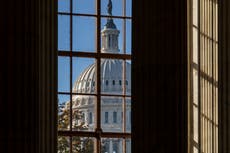US unemployment, sick leave and housing aid to expire in weeks without $908bn Covid relief package
"Without the new aid, the end of a series of key stimulus programs threatens to push the country closer to the financial cliff"

More than two dozen federal stimulus programs crafted to help cash-strapped workers and businesses weather the coronavirus pandemic are set to expire in a matter of weeks, adding urgency to congressional negotiations over a new $908 billion (£684 billion) relief package that might help break months of political deadlock.
Without the new aid, the end of a series of key stimulus programs threatens to push the country closer to the financial cliff. Millions of Americans are set to lose unemployment benefits, access to paid sick leave and protections against evictions. Businesses no longer may be able to count on key tax credits to help their bottom lines, and state and local governments run the risk of having to return millions of dollars they had hoped to spend on the public-health crisis and the financial carnage it has wrought.
"If we let things that are going to expire [actually] expire in December, you are truly going to have widespread hardship," warned Maya MacGuineas, the president of the Committee for a Responsible Federal Budget, which estimated that 25 aid programs from Congress and the White House are set to expire without Washington action. That's on top of a slew of other annual tax and spending provisions that have not been renewed in 2020.
"All the bad things we were worried would happen - but were successfully addressed in the first round of bills - could hit at once," she said. "It would be blatant neglect to allow all these things to expire."
The looming deadlines have grown more pressing amid fresh signs that the US economy is backsliding as the pandemic continues to worsen. The country added only 245,000 jobs in November, according to new federal data released Friday, marking the slowest month of growth since the recovery started this summer. The dour figures arrived as states including California started instituting new restrictions on businesses and public gatherings last week amid a meteoric rise in coronavirus cases, hospitalizations and deaths.
The new decline has galvanised Democrats and Republicans on Capitol Hill in recent days, resulting in the first major bipartisan stimulus compromise in months. The new $908 billion (£684 billion) package outlined in the Senate includes some of Democrats' long-sought priorities, including enhanced unemployment aid and a fresh injection of cash for cities and states that are suffering financially. It also puts new money behind Republicans' push to bolster small businesses' bottom lines and protect a wide array of corporate entities from coronavirus-related lawsuits.
The bipartisan deal has managed to unite the two parties in rare, early accord. House Speaker Nancy Pelosi, D-Calif., and Senate Majority Leader Mitch McConnell, R-Ky., spoke about the matter last week, and Mr McConnell exited the conversation expressing a belief that both sides are "interested in getting an outcome" - though he has also proposed a more scaled-back stimulus plan of his own. President-elect Joe Biden also has encouraged lawmakers to broker the deal, stressing in a speech Friday that the "future will be very bleak" unless Congress acts swiftly.
As the talks have progressed, a wide array of groups representing restaurants, retailers, airlines, hotels and local governments lent their voices to the last-minute push. About 300 associations - belonging to the Covid Relief Now Coalition - wrote to lawmakers on Friday to call on them to adopt a compromise before the end of the year and build on their progress later, warning that the economic consequences of continued inaction could be vast.
"Our country can't wait until 2021," they wrote.
The economy's recent contraction has presented the greatest risks to an estimated 12 million Americans who stand to lose their unemployment benefits before the end of the month if Congress does not act.
The government's $2 trillion ($1.5 trillion) stimulus plan, the Cares Act, greatly boosted jobless assistance: It authorised an extra 13 weeks of aid, increased federal funding for benefits, and offered new help to millions of Americans who drive for Uber, deliver for Grubhub or work for other "gig economy" companies. Without a new stimulus bill, though, some workers are set to run out the clock on their unemployment insurance before they are able to return to the workforce at a time when hiring may be slowing.
Many Americans who have been out of a job for months are set to receive their last checks for the week ending 26 December, according to Michele Evermore, a senior policy analyst at the National Employment Law Project, which advocates for workers' rights.
The expiration of that aid threatens to reverberate throughout the economy. "People don't fully comprehend how somebody else's pain is going to affect them," she said. "It's not just 12 million people losing benefits; it's what those 12 million people would have done with those benefits. It's the landlords not getting rent. It's the financial services companies not getting mortgages and car payments. Belt-tightening is real."
Six days after the aid expires, millions of Americans could face an additional economic blow: Federal protections against evictions are set to expire. The Trump administration announced the moratorium in September, arguing that removing renters from their homes threatened to force families into unsafe, cramped living conditions, contributing to the spread of the coronavirus. But the government's order - enacted by the Centers for Disease Control and Prevention (CDC) - is slated to end after 31 December.
Entering January, renters may owe "anywhere between $30 billion (£22 billion) and $70 billion (£52 billion) in back rent and have no ability to pay," said Diane Yentel, the president of the National Low Income Housing Coalition. She said that an estimated 30-to-40 million people, in 17 million households, could soon face the threat of eviction.
Some landlords initiated eviction proceedings against their tenants even while the CDC order was in place, seeking to capitalize on the Trump administration's confusing policy and a wave of lawsuits filed by organizations representing owners. The result could be a swift opening of the spigot, starting in a matter of weeks, as landlords file a new wave of evictions or seek to enforce the proceedings that have been started.
"The only thing that remains between the renter and being kicked out on the streets is December 31," Ms Yentel said.
The White House repeatedly declined to comment on the eviction order. Instead, spokesman Judd Deere criticised Ms Pelosi and said in a statement that the president "understands that Americans are hurting and need relief, which is why the White House continues to engage with those in congressional leadership who are serious about moving quickly to approve billions in aid."
The CDC did not respond to a request for comment.
For other Americans, the end of the year brings the end of paid family and sick leave benefits. Congress earlier this year required small employers to offer two weeks of paid sick leave as well as additional family leave for those unable to work as a result of Covid-19, the disease that can be caused by the novel coronavirus. If those benefits expire, it could create a wave of uncertainty about workers' health at a time when the US is experiencing its most severe surge in coronavirus cases.
"As people are trying to figure out how to keep schools and workplaces safe, having the ability to take the time off you need is pretty essential," said Tamara Fucile, the senior adviser for government affairs at the Center on Budget and Policy Priorities.
Millions of Americans had no access to such benefits before the pandemic, according to Ms Fucile, leading lawmakers to introduce the provisions as part of their first major stimulus bill in early March. Nine months later, the soon-to-stop aid has helped illustrate an evolution in thinking in Washington as policymakers come to terms with the reality that the coronavirus and its economic harms are unlikely to be short-lived.
"No one at the time thought that we would be in this situation at the end of the year," Ma Fucile said.
Businesses, meanwhile, could lose access to employee-retention credits and other tax benefits at the end of December, months after the Paycheck Protection Program, totaling billions of dollars in forgivable federal loans, ran its course. The aid helped protect businesses' bottom lines after many closed or limited their operations as a result of the coronavirus, cutting into their revenue and forcing them to slash their workforce.
Cities and states are set to face their own cash crunch as a $150 billion (£112 billion) program that covers coronavirus-related expenses is set to lapse at the end of the month. Any dollars they do not spend - including those that aid workers, renters, businesses and even doctors and testing sites - must be returned to the US Treasury even if they are scheduled to be used. Many governors have called on Washington to extend the deadline.
"It's going to be a pretty big transition point at the end of the year," said Garrett Watson, a senior policy analyst for the Tax Foundation, "given the sheer scope of what the Cares Act was doing for individuals and businesses beginning in the spring."
The Washington Post
Join our commenting forum
Join thought-provoking conversations, follow other Independent readers and see their replies
Comments


Bookmark popover
Removed from bookmarks